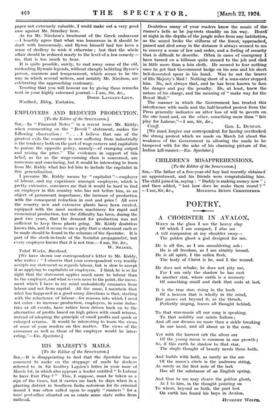EMPLOYERS AND REDUCED PRODUCTION.
[To the Editor of the SPECTATOR.]
SIR,—In " Financial Notes " in a recent issue Mr. Kiddy, when commenting on the " Bovril " statement, makes the following observation " . . . I believe that one of the greatest evils the country is now suffering from industrially is the tendency both on the part of wage earners and capitalists to pursue the opposite policy, namely—of cramping output and raising the price." The evidences in support of this belief, as far as the wage-earning class is concerned, are numerous and convincing, but it would be interesting to learn from Mr. Kiddy what has led him to include the capitalist in this generalization.
I presume Mr. Kiddy means by " capitalist "—employer of labour, and my experience amongst employers, which is pretty extensive, convinces me that it would be hard to find an employer in this country who has not before him, as an object of paramount importance, the increase of production with the consequent reduction in cost and price I All over the country new and extensive plants have been erected, equipped with the most modern machinery for rapid and economical production, but the difficulty has been, during the past two years, that the demand for production was not sufficient to keep these plants going. Mr. Kiddy doubtless knows this, and it seems to me a pity that a statement such as he made should be found in the columns of the Spectator. It is part of the stock-in-trade of the Socialist propagandist, but every employer knows that it is not true.—I am, Sir, &c., [We have shown our correspondent's letter to Mr. Kiddy, who writes : " I observe that your correspondent very readily accepts my statement as regards labour, but is slow to accept it as applying to capitalists or employers. I think he is so far right that the statement applies much more to labour than to the employer, and what is even more to the point, the move- ment which I have in my mind undoubtedly emanates from labour and not from capital. All the same, I maintain that what has happened in a good many directions is that, starting with the reluctance of labour—for reasons into which I need not enter—to increase production, employers, in some indus- tries at all events, have rather been driven back on to the alternative of profits based on high prices with small returns, instead of adopting the principle of small profits and quick or enlarged returns. It would be interesting to learn the views of some of your readers on this matter. The views of the consumer as well as those of the employer would be inter- esting."—En. Spectator.]














































 Previous page
Previous page